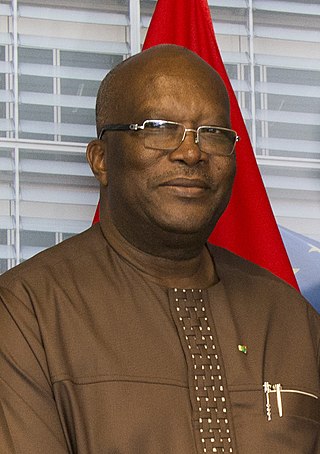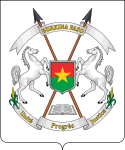
Burkina Faso is a landlocked country in West Africa, bordered by Mali to the northwest, Niger to the northeast, Benin to the southeast, Togo and Ghana to the south, and Ivory Coast to the southwest. It covers an area of 274,223 km2. In 2021, the country had an estimated population of approximately 23,674,480. Previously called the Republic of Upper Volta (1958–1984), it was renamed Burkina Faso by former president Thomas Sankara. Its citizens are known as Burkinabè, and its capital and largest city is Ouagadougou.

The Politics of Burkina Faso takes place in a framework of a semi-presidential republic, whereby the Prime Minister of Burkina Faso is the head of government, and of a multi-party system. The President of Burkina Faso is the head of state. Executive power is exercised by both the President and the Government. Legislative power is vested in both the government and parliament. The party system was dominated by the Congress for Democracy and Progress (CDP) until 2014. Burkina Faso's CDP fell victim to a series of demonstrations and riots, to alter the constitution and extend the former president's term in office - referred to as the 2014 Burkinabé uprising. The military then declared itself to be in power and the state shifted to an electoral autocracy. Burkina Faso lacks the foundation that would support a democracy, with its current transition to a military regime, but not all hope is lost. After an internal coup ousted Paul-Henri Sandaogo Damiba, the previous military head of state, a new transitional charter was adopted, naming Captain Ibrahim Traoré as president. Mr. Damiba's progressional failures on the state's security front “swung a majority of domestic opinion in favour of the MPSR”. Mr. Traoré pledged a major reinforcement of armed forces to strengthen frontline units and recruited over 3,000 more troops. As the violence becomes so entrenched, it is nonetheless expected that the security situation will remain dire in the medium term. “However, we expect that elections will still be held in 2024 as part of the army's plan to stabilise the security situation by boosting counter-terrorism operations.”

The history of Burkina Faso includes the history of various kingdoms within the country, such as the Mossi kingdoms, as well as the later French colonisation of the territory and its independence as the Republic of Upper Volta in 1960.

Blaise Compaoré is a Burkinabé-Ivorian former politician who served as the second president of Burkina Faso from 1987 to 2014. He was a close associate of the first president, Thomas Sankara, during the 1980s and in October 1987 he led a coup d'état during which Sankara was killed. Subsequently, he introduced a policy of 'rectification', overturning the leftist and Third Worldist policies pursued by Sankara. He won elections in 1991, 1998, 2005, and 2010, in what were considered unfair circumstances. His attempt to amend the constitution to extend his 27-year term caused the 2014 Burkinabé uprising. On 31 October 2014, Compaoré resigned, whereupon he fled to the Ivory Coast. In April 2022, he was found guilty by a special military tribunal of complicity in Sankara’s murder. He is also the longest-serving president of Burkina Faso.

Burkina Faso elects on the national level a head of state – the president – and a legislature. The president is elected for a five-year term by the people. The National Assembly has 127 members, elected for a five-year term by proportional representation. Burkina Faso has held democratic elections since 1965. The history of elections has been slightly inconsistent, with the government dynamically changing at the hands of various coups, constitutional changes, and boycotts from various political parties. In 2015, the country experienced its first peaceful and fair election ever. Corruption plagued Burkina Faso's presidential elections for 50 years, but following a coup overthrowing Blaise Compaoré, the nation has seen more democratic and less corrupt electoral processes. Terrorism has played a substantial role in Burkina Faso's elections, with candidates running on the promise to keep the nation safe from the rise of Islamic jihadism they experienced in the 2010s. Historically, a few different parties have held power in Burkina. The Organization for Popular Democracy – Labour Movement was former president Compaoré's party affiliation, and thus they held power from 1987 to 2014. His party took power through a coup, and in 2014 also lost their control when the Regiment of Presidential Security overthrew the government.

Roch Marc Christian Kaboré is a Burkinabé banker and politician who served as the President of Burkina Faso from 2015 until he was deposed in 2022. He was the Prime Minister of Burkina Faso between 1994 and 1996 and President of the National Assembly of Burkina Faso from 2002 to 2012. Kaboré was also president of the Congress for Democracy and Progress (CDP) until his departure from the party in 2014. He founded the People's Movement for Progress party that same year.

The unicameral National Assembly is the legislative body of Burkina Faso. In 1995, it became the lower house of a bicameral parliament, but the upper house was abolished in 2002. The upper house was to have been restored under the name "Senate" in the June 2012 constitutional amendments. This revision was never executed due to an extended and unresolved political confrontation over the Senate's establishment, which left the country effectively with a unicameral legislature as of the October 2014 constitutional crisis.

Sankarism is a term sometimes applied to denote a left-wing ideological trend within the politics of Burkina Faso, a landlocked country in West Africa, as well as the policies of the military government led by Captain Thomas Sankara. Sankara came to power in what was then the Republic of Upper Volta in a popularly supported 1983 military coup, and ruled until his assassination in a coup led by Blaise Compaoré in 1987.

General elections were held in Burkina Faso on 29 November 2015. The elections were the first national elections in the country since the 2014 Burkinabé uprising and the departure of President Blaise Compaoré, who had ruled Burkina Faso for 27 years. The party of former President Compaoré, the Congress for Democracy and Progress, was banned from presenting a presidential candidate in the presidential elections but was still able to participate in the parliamentary election.

The 2014 Burkina Faso uprising was a series of demonstrations and riots in Burkina Faso in October 2014 that quickly spread to multiple cities. They began in response to attempts at changing the constitution to allow President Blaise Compaoré to run again and extend his 27 years in office. Pressure for political change came from civil society and in particular from the country's youth. Following a tumultuous day on 30 October, which included the involvement of former Defence Minister Kouamé Lougué and the burning of the National Assembly and other government buildings as well as the ruling Congress for Democracy and Progress party's headquarters, Compaoré dissolved the government and declared a state of emergency before eventually fleeing to Côte d'Ivoire with the support of Ivorian President Alassane Ouattara.

The People's Movement for Progress is a political party in Burkina Faso that was founded on 25 January 2014 by former Congress for Democracy and Progress member Roch Marc Christian Kaboré. Kaboré ran as the party's presidential candidate in the 2015 general election and was elected in the first round of voting; the MPP also won a plurality of seats in the National Assembly of Burkina Faso. It is a full member of the Progressive Alliance and Socialist International. On January 24, 2022, Kaboré was deposed as Burkina Faso President and arrested following a military coup.

Général d’Armée Assimi Goïta is a Malian military officer who has been interim President of Mali since 28 May 2021. Goïta was the leader of the National Committee for the Salvation of the People, a military junta that seized power from former president Ibrahim Boubacar Keïta in the 2020 Malian coup d'état. Goïta later seized power from Bah Ndaw in the 2021 Malian coup d'état and has since been declared interim president of Mali.

A coup d'état was launched in Burkina Faso on 23 January 2022. Gunfire erupted in front of the presidential residence in the Burkinabé capital Ouagadougou and several military barracks around the city. Soldiers were reported to have seized control of the military base in the capital. The government denied there was an active coup in the country. Several hours later, President Roch Marc Christian Kaboré was reported to have been detained by the soldiers at the military camp in the capital. On 24 January, the military announced on television that Kaboré had been deposed from his position as president. After the announcement, the military declared that the parliament, government and constitution had been dissolved. The coup d'état was led by military officer Paul-Henri Sandaogo Damiba.

Paul-Henri Sandaogo Damiba is a Burkinabè military officer who served as interim president of Burkina Faso from 31 January 2022 to 30 September 2022, when he was removed in a coup d'état by his own military colleague Ibrahim Traoré. Damiba had come to power just eight months earlier, on 24 January 2022, when he removed president Roch Marc Christian Kaboré in a coup.

The Patriotic Movement for Safeguard and Restoration (PMSR) has been the ruling military junta of Burkina Faso since the January 2022 Burkina Faso coup d'état. Originally it was led by Paul-Henri Sandaogo Damiba, but he was overthrown by dissatisfied junta members during the September 2022 Burkina Faso coup d'état. In his place, Capt. Ibrahim Traoré was installed as the leading figure. Aside of Traoré and Sorgho, other MPSR members are not known to the public.

A coup d'état took place in Burkina Faso on 30 September 2022, removing Interim President Paul-Henri Sandaogo Damiba over his alleged inability to deal with the country's Islamist insurgency. Damiba had come to power in a coup d'état eight months earlier. Captain Ibrahim Traoré took over as interim leader.

Ibrahim Traoré is a Burkinabè military officer who has been the interim leader of Burkina Faso since the September 2022 coup d'état that ousted interim president Paul-Henri Sandaogo Damiba. At age 36, Traoré is currently the youngest serving state leader in the world, and the youngest serving president.
On 26 September 2023, dissidents of the Burkina Faso Armed Forces attempted to overthrow the ruling military junta led by Ibrahim Traoré, which came to power a year earlier.













